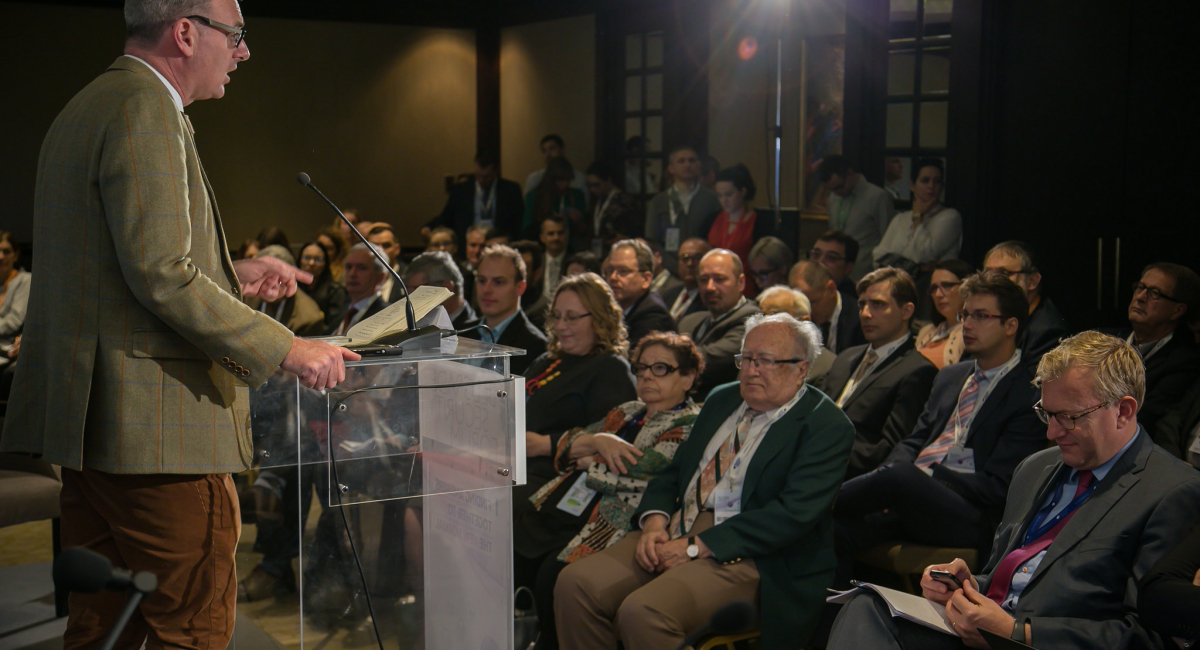EUNPACK at the Belgrade Security Forum 2018

This year’s Belgrade Security Forum started on 17 October with a full day of debates organised as part of the Horizon 2020 ‘EUNPACK’ project. The BSF, in its eight edition, is the leading international affairs conference in the Western Balkans and was attended by hundreds of policymakers, diplomats, businesspeople, civil society representatives and academics from more than 30 countries. The Academic Event that opened the conference was held under the title “How Conflict-Sensitive is the EU Crisis Response” and explored, just like EUNPACK overall, how EU crisis responses function and are received on the ground. Close to 140 people attended.
The Academic Event opened with a keynote by Roger Mac Ginty, Professor of Defence, Development and Diplomacy at the School of Government and International Affairs at Durham University, in which he examined the term ‘local’, which has become a buzzword in policy and academic circles in recent years. He asked where and what is the local, and how outsiders access it, and ended by considering some of the practical implications of attempting to make contact with it. He pointed out that often, ‘local’ is meant to refer to sub-national, when in fact most people’s lives are hyper-local or micro-local. The notion needs to be liberated from its association with backwardness and lack of civilization and seen instead as a different form of modernity, one that offers solutions to many problems thanks to its legitimacy and authenticity, notably in the field of conflict prevention and peacebuilding.
A first panel opened with Steven Blockmans from the Centre for European Policy Studies (CEPS) who provided a big-picture view of the EU’s integrated approach to crisis response and the extent to which there has been learning from NATO, the UN and the OSCE. Based on the findings of his article with colleague Loes Debuysere, he showed how the broad principle of comprehensiveness has been developed to fit different institutional logics, thus leading to divergences in outreach. Distilling findings from empirical research conducted in the framework of the EUNPACK project, he synthesised lessons about varying levels of the EU’s conflict sensitivity, effective multilateralism, value-based approach and application of the principle of local ownership in theatre. His talk was followed by three case studies, of EU crisis management in Mitrovica, Kosovo (Jozef Bátora, Comenius University, Bratislava), of the EULEX mission in Kosovo (Mateja Peter, Norwegian Institute of International Affairs), and of South Ossetia (Irena Mnatsakanyan, Sapienza University of Rome).
A second panel considered EU crisis response and border management in Libya and Ukraine (Chiara Loschi, Institute for European Integration Research, University of Vienna), EU crisis response in Iraq, Mali and Afghanistan (Enver Ferhatović, Center for Transnational Studies, Foreign and Security Policy), the EU in Mali (Morten Bøås, Norwegian Institute of International Affairs), and the EU’s response to the crisis in Ukraine (Vsevolod Samokhvalov, University of Liège and Vesalius College/Free University of Brussels).
The Academic Event was wrapped up by Morten Bøås, the project coordinator, and Pernille Rieker from NUPI, who brought together various strands of the debate. Can the EU become a truly transformational actor in crisis situations? Does it have a learning culture that would help it improve its responses? Are there processes in place to ensure that top-down and bottom-up meet somewhere – that local agencies and perceptions meet the expectations and ambitions of the EU’s institutions? Can the EU repair its credibility as a ‘normative’ or ‘transformative’ power, which has been damaged by ‘principled pragmatism’ and its security fixation? They answered all these questions affirmatively, provided the EU institutions and member states continue to invest in conflictsensitive policy and value-based approaches which incorporate the ‘local’ and complement actions by other multilateral organisations in theatre.
Picture: BSF/Aleksandar Andjic

